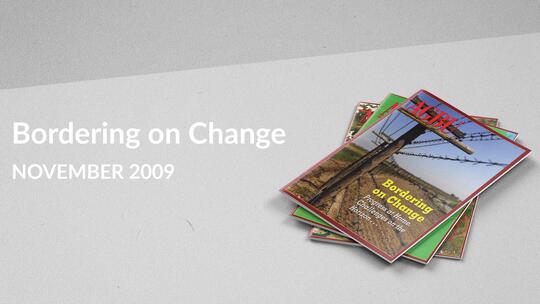In the fairy tale that Hayk Habosian tells his little sister Lili, a gray wolf enters the house of a black kitty, as if to eat the kitten.
Instead, the wolf says to the little cat, "How wonderful you are! Shall we dance?"
"I want to dance the rumba," says the wolf.
"Then," Hayk tells Lili, "the wolf and kitty become such great friends they become dance partners in competitions."
The 26-year-old brother makes up the fairy tale for his 11-year- old sister, but the content of the story is partly familiar for Hayk, whose unlikely dream of dancing is being realized.
Hayk Habosian was Lili's age when he first saw Michael Jackson dance on TV and at once was captivated with the graceful body language displayed by the "King of Pop."
Habosian realized that most of all he wanted to dance like his idol and, in a few years, many in Armenia saw Hayk's performance and some even called him a "phenomenon." Habosian danced with determination and skill. But unlike his idol, the Armenian dancer could not hear the music.
At five months old, Hayk lost his hearing due to an infection. Since then, he has lived on senses that don't require sound. (Using a hearing aid, he can hear only four percent.)
And while many might wonder how it is possible to dance without hearing the music, Habosian—explaining thoughts with gestures and low sounds—says dance is passion, an inseparable part of his life.
Hayk's mother, Marine Habosian, says that she has raised her son so that he wouldn't feel that his hearing impairment is a hindrance. In Armenia, where those with physical afflictions are often isolated, Marine integrated her son into society. She gave him errands, including going out to do shopping, just as she did his hearing brother and sister.
But Hayk soon proved that he was indeed "special," though not in the sense usually applied to someone who has impairment. One day Marine heard very loud music and...
"When I entered his room and saw that he was playing very loud music and was dancing, I thought that the boy might be hearing," Marine says.
He wasn't. But he was feeling the music.
As soon as his father realized that his son wanted to dance, he took him to classes at Arai Dance Show dance group.
"Yes, it was hard for me at first," says Hayk. "I was different from the other children in the group. But my first teacher and generally everybody helped me a lot. I managed to integrate into dancing."
In fact, Hayk is now a lead dancer of Arai Dance Show, which performs at different shows and concerts in Armenia. Hayk specializes in hip hop, break dancing and Latino.
Fellow lead dancer Anita Abgarian remembers the first time she saw Hayk dance.
"I met him during a festival we both were participating in and Hayk was only 11. He was dancing amazingly for that age, but I did not know anything about him being deaf until it was announced that Hayk won a Grand Prix. The whole audience gave him a standing ovation, parents were crying, and I understood that little boy was a phenomenon," says Abgarian, 29.
Abgarian calls her dance partner the "sun of our group," and she considers him to be one of the best experts of "dance language" in Armenia. "He never gives you room to think that he differs from others," she says.
"We are the same. The difference is that he is kinder, and sometimes I even envy him, because in many cases he does not hear how malicious people can be. He does not notice some shortcomings of the world," she says.
When Karen Mikayelian, the head of Arai, admitted Hayk to the dance group, he did not imagine the day would come when this new student would emerge to be a lead dancer.
"When Hayk's father first brought him here, we faced a big dilemma (adding that he had never had a deaf student). But it turned out that I never regretted accepting him into our group, because he was a very smart child, and he gave us even more than we could have expected," Mikayelian remembers. "He has such a huge amount of inner strength, that those emotions that we get from music, he already has inside of him."
Hayk dreams of having his own studio where he can lead a dance class and pass his favorite language skills on to all the children who, like him, want to dance.
The dancer dreams, too, of joining his father who is in Los Angeles. While he, his mother, sister and brother live in Yerevan, his father has been in Los Angeles for five years. The father initially worked as an accountant and had hoped to bring Hayk to the States. Now, though, he is a taxi driver. Hayk has applied for a visa four times, once simultaneously with his father. But he has been denied. He says he thinks it's because he's deaf.
In Armenia several dance groups for the deaf are headed by people who can hear. But Hayk has reversed that trend. Last spring at Arai he taught not only a hip hop class for hearing impaired children, but also a hip hop and Latino class for children who can hear.
In September he started another session of classes, teaching children who need only find the passion for dance, if not the sound.






